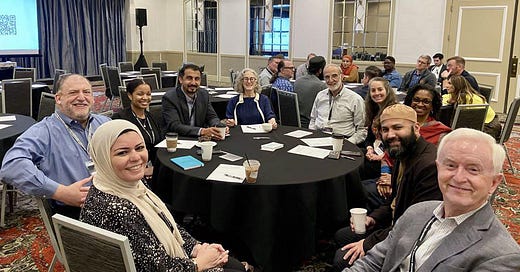“We might not have changed the world, but I know we’ve changed each other.”
Reflections on the 2025 One America Movement Summit
“This interactive session was very helpful” — Summit attendee
“We might not have changed the world, but I know we’ve changed each other.” These words have been ringing in my ears since last Monday night when Derek Monson, a religious freedom expert and Chief Growth Officer at the Sutherland Institute in Salt Lake City, spoke them to Rev. Dr. Marian Edmonds-Allen, Executive Director of Parity, a faith-based LGBTQ-focused organization, while on stage at the One America Movement’s annual national Summit. We had invited Marian and Derek, along with three other pairs of people from our nationwide network, to share the stories of their unlikely friendships across political and religious divides. Derek’s words have stuck with me ever since then.
Each year, One America brings faith leaders together from across the country for this flagship event. These faith leaders may have little in common. They come from different regions and religions. They are of different races and political leanings. They lead small or large congregations or institutions or no formal group at all. But what they share is a profound understanding that our faiths call us beyond our ideological bubbles and into relationship with each other as children of God. Together, they know that there is a better way than our country’s toxic divisions.
Over the course of two days, we heard from faith leaders who are speaking and acting against polarization, not despite their faith tradition but because of it. These leaders are guiding their congregations to hold fast to the teachings of their faith – the teachings that instruct them to see the image of God in everyone they meet, welcome strangers, love their neighbors, and pray for their enemies. These tenets seem countercultural in a world of declining trust, fractured relationships, and political polarization that pits us against each other. And yet these faith leaders, each in their own way and in the context of their own faith traditions, are pushing back against this cultural moment, holding their communities to a higher spiritual standard and building bridges with those who might not look, vote, or worship like they do. Standing in that room of 250 faith leaders was truly remarkable.
As I said to this assembled group on the evening of the second day, I have learned two things about depolarization work. First, it is risky. When you hold your community to a higher moral standard, you risk being shouted down; when you reach out across divides, you risk being painted as a traitor. Faith leaders have lost congregants, relationships, and even their jobs over this work. Second, it is lonely. When everyone around you has been sucked into the vicious cycle of polarization, retreating to their ideological echo chambers and congratulating themselves for their “right” opinions, it is isolating to stand in your own convictions and call out to your compatriots. You begin to wonder whether it is you or the rest of the world that has gone mad.
The reason Derek’s words have been ringing in my ears is that they remind me of a third truth about this work: it is personal. When addressing the polarization that pushes us into our corners, it is not enough to want to change those across the aisle or across our divides. We must also be willing to be changed, ourselves. Derek and Marian’s friendship and the work they have accomplished for both religious freedom and the LGBT community depend on a willingness to hear each other, to connect across their differences, and ultimately to be changed by that experience.
This is why events like One America’s Summit are so important. One thing we know for sure is that belonging matters. When we feel the security of a group, we are emboldened to stand up for what we believe and feel safe to be vulnerable. And although those 250 faith leaders come from different walks of life, they all belong to this community of people who are showing moral leadership in a moment when our country truly needs it. When we come together in places like this Summit, we may disagree about policies or theology. We may argue over hot-button issues, and we may get “spicy” (a favorite word used at the Summit last week), but we know that when we go home, there are hundreds of other people across this country whose faith also calls them to eliminate toxic polarization, and who are committed to doing this work alongside us. We are in this together. And maybe, just maybe, we are changed by that community, as well.
As we wrapped up yet another successful Summit, we asked participants what they were feeling as they were headed home. The most common answers? Hopeful. Connected. Inspired. Energized.
This is no small feat in a world that feels so hopeless and disconnected. Thank you to all our speakers and storytellers who inspired us, the staff of the Hyatt Regency Downtown Tulsa who so graciously hosted us, the One America staff who worked tirelessly behind the scenes, and all those who spent three days with us at the One America Movement Summit last week. I, too, leave hopeful but also humbled by your commitment to this risky, lonely, and ultimately life-changing work.
Chandra DeNap Whetstine is the Chief Operating Officer at the One America Movement.





